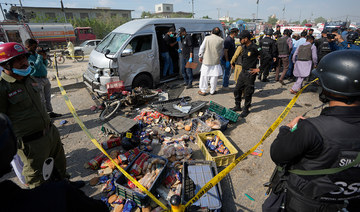ISLAMABAD: Pakistan will receive a loan worth $2.1 billion from staunch ally China by Monday, the Pakistani finance ministry said, an injection that will help stabilize a wobbly economy hurt by a shortage of dollars plus ballooning current account and fiscal deficits.
Pakistan has been searching for investment from friendly countries since the government of Prime Minister Imran Khan took office in August.
Both Saudi Arabia and the United Arab Emirates have each offered Islamabad loan packages of $3 billion. Islamabad is also in talks with the International Monetary Fund (IMF) for a bailout deal expected to be signed next month.
Unlike China and countries in the Middle East, the IMF is likely to demand painful structural reforms that might clash with the political agenda of Khan, who on the campaign trail vowed to build an Islamic welfare state.
“All procedural formalities for the loan worth $2.1 billion from China have been completed,” Dr. Khaqan Hassan Najeeb, the spokesperson for the Ministry of Finance, told Arab News, adding that the amount would be deposited in the central bank of Pakistan by March 25 to “help improve foreign exchange reserves and ensure the balance of payment stability.”
In November last year, China promised to support Pakistan’s economy following a meeting in Beijing between Chinese Premier Li Keqiang and Prime Minister Khan. The two countries also share the $60 billion China-Pakistan Economic Corridor (CPEC), which Beijing touts as the flagship infrastructure program in its vast Belt and Road Initiative.
On Friday, Gerry Rice, Director of Communications at the IMF, said at a press conference that the Fund was “closely engaged” in discussions with Pakistan for a loan deal and would take a mission to Pakistan “shortly.”
“I can’t put a date on when they [discussions] would conclude or when we would be in a position to announce agreement,” Rice added.
Fitch Solutions, a statistical rating organization headquartered in New York, said in a statement last month that Pakistan and the IMF could reach an agreement for a potential bailout package of about $12 billion.
Pakistan to receive $2.1 billion loan from China by March 25
Pakistan to receive $2.1 billion loan from China by March 25
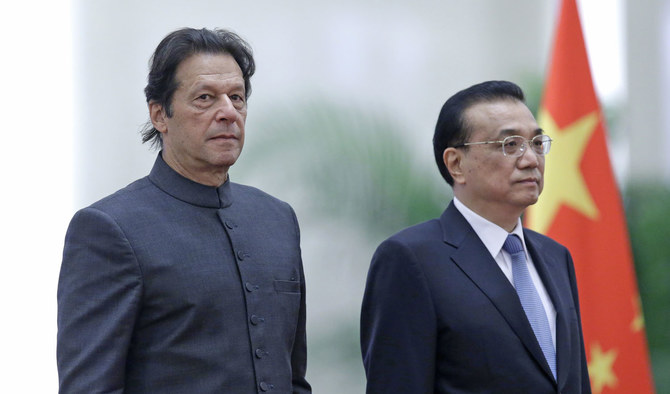
- Pakistani finance ministry says loan will “help improve foreign exchange reserves and ensure balance of payment stability”
- Pakistan also “closely engaged” in bailout discussions with the IMF
Pakistan send New Zealand in to bat in second T20I

- The clear weather is in contrast to Thursday’s first game which was cut short to five-over-a-side before being abandoned
- Pakistan kept the same eleven of the first game, having handed T20I caps to Usman Khan, Abrar Ahmed and Muhammad Irfan Khan
RAWALPINDI: Pakistan skipper Babar Azam won the toss and opted to bowl in the second Twenty20 international against New Zealand in Rawalpindi on Saturday.
The clear weather is in contrast to Thursday’s first game which was cut short to five-over-a-side before being abandoned after just two balls in New Zealand’s batting due to intermittent rain.
Pakistan kept the same eleven of the first game, having handed T20I caps to batter Usman Khan, spinner Abrar Ahmed and allrounder Muhammad Irfan Khan on Thursday.
New Zealand, missing nine players due to the Indian Premier League, brought in Cole McConchie in place of unwell Josh Clarkson.
The remaining matches are in Rawalpindi on April 21 and in Lahore on April 25 and 27.
Teams
Pakistan: Babar Azam (captain), Usman Khan, Abrar Ahmed, Iftikhar Ahmed, Mohammad Rizwan, Mohammad Amir, Muhammad Irfan Khan, Naseem Shah, Saim Ayub, Shadab Khan, Shaheen Shah Afridi
New Zealand: Michael Bracewell (captain), Mark Chapman, Cole McConchie, Jacob Duffy, Dean Foxcroft, Ben Lister, Jimmy Neesham, Tim Robinson, Ben Sears, Tim Seifert, Ish Sodhi
Pakistani province issues flood alert and warns of heavy loss of life due to glacial melting
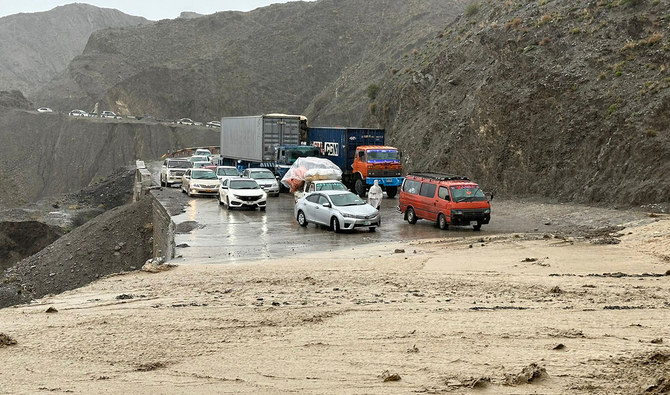
- The country has witnessed days of extreme weather, killing scores of people, destroying property
- Experts say Pakistan is experiencing heavier rains than normal in April because of climate change
PESHAWAR: A Pakistani province has issued a flood alert due to glacial melting and warned of heavy loss of life, officials said Saturday.
The country has witnessed days of extreme weather, killing scores of people and destroying property and farmland. Experts say Pakistan is experiencing heavier rains than normal in April because of climate change.
In the mountainous northwest province of Khyber Pakhtunkhwa, which has been hit particularly hard by the deluges, authorities issued a flood alert because of the melting of glaciers in several districts.
They said the flood could worsen and that people should move to safer locations ahead of any danger.
“If timely safety measures are not taken, there is a possibility of heavy loss of life and property due to the expected flood situation,” said Muhammad Qaiser Khan, from the local disaster management authority.
Latest figures from the province said that 46 people, including 25 children, have died in the past five days due to rain-related incidents.
At least 2,875 houses and 26 schools have either collapsed or been damaged.
The southwest province of Baluchistan has also been battered by rainfall. It said it had limited resources to deal with the current situation but if the rains continued, it would look to the central government for help.
In 2022, downpours swelled rivers and at one point inundated one-third of Pakistan, killing 1,739 people. The floods also caused $30 billion in damage.
Pakistan’s monsoon season starts in June.
Punjab seeks suspension of cellular services during Sunday’s by-polls in 13 cities
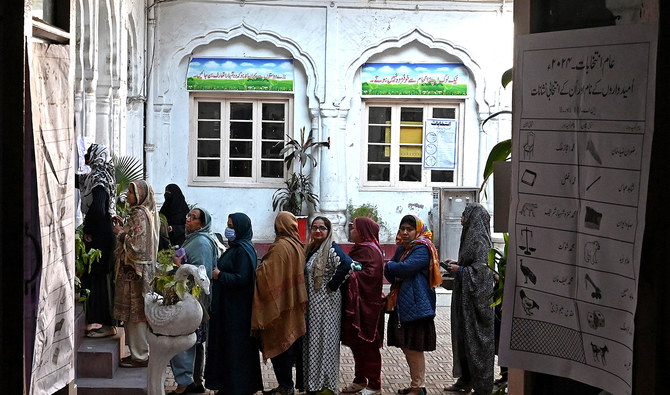
- By-elections will be held on 21 national, provincial seats in Punjab, Khyber Pakhtunkhwa and Balochistan provinces
- Pakistan’s national polls in Feb. were marred by mobile service shutdown, result delays, leading to rigging allegations
ISLAMABAD: The provincial government in Pakistan’s eastern Punjab province has requested for the suspension of mobile phone services in 13 cities during the by-elections on Sunday, according to the Punjab home department.
By-elections on 21 national and provincial seats in Punjab, Khyber Pakhtunkhwa (KP) and Balochistan provinces are scheduled to be held on April 21. Electioneering in these constituencies came to an end at midnight on Friday, according to a deadline set by the Election Commission of Pakistan (ECP).
In a letter to the interior ministry, the Punjab government requested suspension of mobile phone services in Talagang, Chakwal, Kallar Kahar, Gujrat, Ali Pur Chatha, Zafarwal, Bhakkar, Kasur, Sheikhupura, Lahore, Sadiqabad, Kot Chutta and Dera Ghazi Khan.
“I have been directed to request that mobile Internet services may kindly be suspended on 21st April, 2024 for maintaining law and order situation and to avoid any untoward incident [in the aforementioned areas],” a section office of the Punjab home department wrote in his letter to the interior ministry.
The seats, which are up for grabs in Sunday’s by-polls, were left vacant due to postponement of polls or were vacated by lawmakers, who won multiple seats, in national election in February.
The request by the Punjab home department comes amid expectations of a fierce competition between candidates backed by jailed former prime minister Imran Khan’s Pakistan Tehreek-e-Insaf (PTI) party and rival political groups.
Pakistan’s national election on Feb. 8 was marred by a mobile service shutdown and unusually delayed results, leading to accusations that the vote was rigged and drawing concern from rights groups and foreign governments.
Several political parties, including Khan’s PTI, and candidates had held protests and challenged many of the results before the ECP. However, the outgoing caretaker government and the ECP had denied allegations of any systematic rigging of the vote.
Police say attack on Japanese nationals in Karachi can be case of ‘mistaken identity’
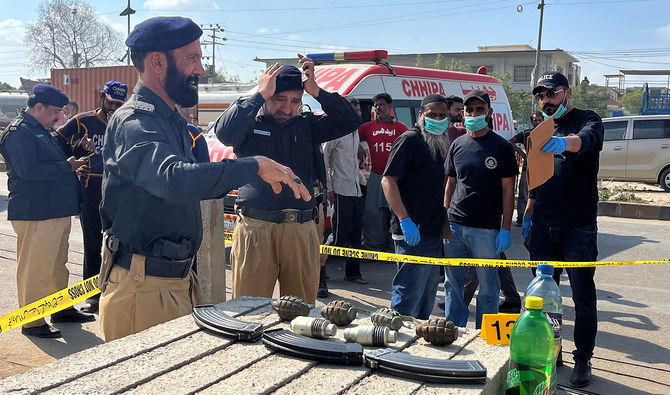
- In the past, Baloch separatists have claimed responsibility for attacks on Chinese nationals in the Pakistani port city
- However, Friday’s suicide attack on a van was the first incident in Pakistan that appeared to target Japanese nationals
KARACHI: The suicide attack on Japanese nationals in Pakistan’s southern city of Karachi could be a case of “mistaken identity” as no group has claimed responsibility for it, a senior police officer said on Saturday.
The Japanese nationals were traveling on Friday in a Hiace van to an industrial area, where they worked at Pak Suzuki Motors, when the suicide bomber detonated his explosive-laden vest near the van, according to police.
A police team escorting the vehicle returned fire after coming under attack, killing an accomplice of the suicide bomber. Officials said one of the attackers was identified as Sohail Ahmed, a resident of Panjgur district in the southwestern Balochistan province.
However, Ghulam Nabi Memon, the provincial police chief, said no militant group had accepted responsibility for the attack and it seemed they didn’t intend to attack the Japanese.
“For now, it seems to us to be a case of mistaken identity,” Memon told Arab News. “We are reviewing security protocols. The police and intelligence agencies are making efforts [to arrest the perpetrators].”
In the past, Baloch separatists have claimed responsibility for attacks on Chinese nationals in the Pakistani port city. However, this is the first time that the Japanese have come under such an attack.
A police officer, who spoke on the condition of anonymity, told Arab News that police suspected the attack was carried out by the outlawed Balochistan Liberation Army (BLA). The group has claimed several attacks, including the ones on the Chinese consulate in Karachi, Karachi Stock Exchange, and a suicide attack on Chinese teachers at Karachi University.
A BLA spokesperson didn’t respond to Arab News request for a comment on the attack.
Hours after the attack, Baloch activists shared videos on X, claiming raids were conducted on the homes of their supporters in Karachi.
A police officer, who requested anonymity, confirmed that raids were made to arrest the perpetrators and facilitators of the incident, but declined to share if any arrests were made.
“All I can share is that we are going in the right direction and an important breakthrough will be made soon,” he said.
On Friday, a police handout said the provincial police chief had chaired a high-level meeting, wherein he emphasized the need to establish a dedicated unit for the protection of Chinese nationals.
The police chief also stressed strict implementation of the standard operation procedures (SOPs) regarding the security of foreign delegates and regular issuance of security adviseries by authorities.
“Further discussions centered on enhancing security measures for all Chinese residents, experts, staff, and other foreign guests/delegates in Sindh,” the handout read.
In recent weeks, militants have targeted Chinese nationals working in Pakistan on projects relating to the China-Pakistan Economic Corridor (CPEC), a major segment of Beijing’s Belt and Road infrastructure initiative, which will connect China to the Arabian Sea and help Islamabad expand and modernize its economy through a network of roads, railways, pipelines and ports in Pakistan.
In March, five Chinese nationals and their Pakistani driver were killed in northwest Pakistan, when a suicide bomber rammed his explosive-laden car into the bus carrying them to Dasu Dam, the biggest hydropower project in Pakistan, where they worked.
Saudi cadet bags gold medal as fresh batch graduates from Pakistan Military Academy
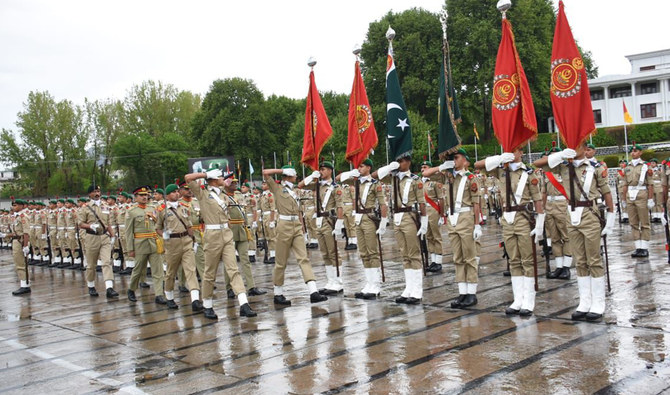
- Forty-nine cadets from “friendly countries” graduate from Pakistan Military Academy in Kakul, says army
- The PMA provides initial training to Pakistani cadets and recruits from friendly countries such as Saudi Arabia
ISLAMABAD: The Pakistan Army awarded the Chairman Joint Chiefs of Staff Committee Overseas Gold Medal to a Saudi cadet in recognition of his performance, as a fresh batch of local and international cadets graduated from the Pakistan Military Academy (PMA) on Saturday, the army’s media wing said.
General Sahir Shamshad Mirza, chairman joint chiefs of staff committee, was the chief guest at the passing out parade of the 149th PMA Long Course at the academy in Kakul. General Metin Gürak, the chief of the Turkish general staff who is on an official visit to Pakistan, was the guest of honor at the ceremony.
Gen. Mirza reviewed and spoke to cadets at the parade while General Gürak presented the awards to the distinguished cadets, the Inter-Services Public Relations (ISPR) said.
“The Chairman Joint Chiefs of Staff Committee Overseas Gold Medal was awarded to Friendly Country Senior Under Officer Fahad Bin Aqil Al Towarqi Al Fallaj from Kingdom of Saudi Arabia,” the ISPR said.
The army’s media wing said 49 cadets from “friendly countries” also graduated at the ceremony. The coveted Sword of Honour was awarded to Academy Senior Under Officer Muhammad Nauman Abdullah.
The President’s Gold medal was awarded to Company Senior Under Officer Muhammad Abdullah Javed of the 149th PMA Long Course, the army’s media wing said.
“Since its inception, PMA has remained the cradle of leadership and center of excellence for cadets joining the premier institution of Army,” Gen. Mirza was quoted as saying by the ISPR.
“Over the years, PMA has also trained scores of foreign cadets whose brilliant performance in their respective Armies stands testament to the professional ethos of PMA.”
The PMA in Kakul, Abbottabad, provides initial training to Pakistan Army cadets and recruits from friendly countries, including Saudi Arabia, the Middle East and elsewhere in the world.
Pakistan and Saudi Arabia enjoy fraternal relations, leading the two countries to cooperate in trade, defense and other vital sectors.
The Kingdom is home to over 2.7 million Pakistani expatriates and serves as the cash-strapped South Asian country’s largest source of remittances.



